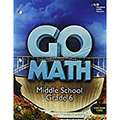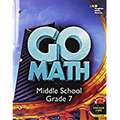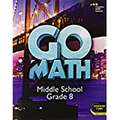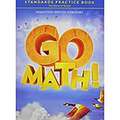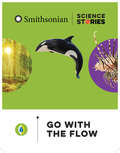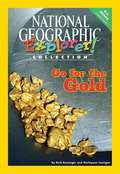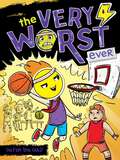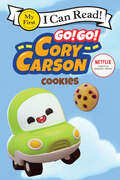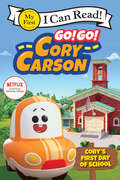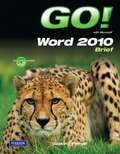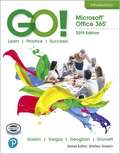- Table View
- List View
Go Math, Grade 6, Middle School: Student Edition Grade 6 2018 (Go Math! (StA))
by Timothy D. Kanold Edward B. Burger Juli K. DixonNIMAC-sourced textbook
Go Math, Grade 8, Middle School: Student Edition 2018 (Go Math! (StA))
by Timothy D. Kanold Edward B. Burger Juli K. DixonNIMAC-sourced textbook
Go Math, Middle School, Grade 6
by Timothy D. Kanold Edward B. Burger Juli K. DixonNIMAC-sourced textbook
Go Math, Middle School, Grade 6
by Timothy D. Kanold Edward B. Burger Juli K. DixonNIMAC-sourced textbook
Go Math, Middle School, Grade 7
by Timothy D. Kanold Edward B. Burger Juli K. DixonNIMAC-sourced textbook
Go Math, Middle School, Grade 7
by Timothy D. Kanold Edward B. Burger Juli K. DixonNIMAC-sourced textbook
Go Math, Middle School, Grade 8
by Timothy D. Kanold Edward B. Burger Juli K. DixonNIMAC-sourced textbook
Go Math, Middle School, Grade 8
by Timothy D. Kanold Edward B. Burger Juli K. DixonNIMAC-sourced textbook
Go Math: Middle School, Grade 7
by Timothy D. Kanold Edward B. Burger Juli K. Dixon Steven J. Leinwand Matthew R. Larson Martha E. Sandoval-MartinezThis textbook for 7th graders covers essential math topics, with study guide reviews and assessments.
Go Math: Standards Practice Book (Grade #4)
by The Editors at the Houghton Mifflin Harcourt Publishing CompanyThis is a comprehensive book that covers Whole Number,Area and Geometry,Fractions and Decimals with practice and test preparation sections.
Go Organic, Level 6
by Saddleback Educational Publishing StaffThemes: Hi-Lo, nonfiction, full-color, differentiated instruction. Teach environmental studies and global warming in the inclusive classroom with these unique informational books. Available in two reading levels with identical front covers, so striving readers do not feel "singled out," each title methodically explains the tough problems faced by our planet plus solutions large and small. Features include: Reading level 3 books are Fountas-Pinnell level O, P, and Q; reading level 6 books are Fountas-Pinnell level W. Scientific terms are defined in context. Identical dramatic four-color covers (back cover band identifies books that are lower level). Teacher's Guides with reproducible activities allow students to work from either text. Glossary defines difficult terms. "Did You Know?" sections contain interesting facts. End-of-book "Facts & Figures" section summarizes critical information. The index takes students directly to topics of interest.
Go for the Gold (The Very Worst Ever #6)
by Andy NonamusA very unlucky kid worries his misfortune has rubbed off on his gifted friend in the sixth book in The Very Worst Ever chapter book series!Everyone knows the Golds: Olympic gold-medalist, all-star athletes who run everywhere they go. Their son and one of [REDACTED]&’s best friends, Jake, is no different. But during gym class, a rare stroke of luck helps [REDACTED] score the most points during a scooter soccer game. Jake&’s never been number two. Has [REDACTED] unwittingly traded luck with his gifted friend? With easy-to-read language and illustrations on almost every page, The Very Worst Ever chapter books are perfect for emerging readers.
Go to Bed, Blue (Penguin Young Readers, Level 1)
by Bonnie BaderDid you know that even aliens have a hard time going to bed?Blue, an alien from outer space, may make a great friend, but he’s not very good at going to bed. It takes patience and some bedtime tricks to get this alien to settle down! Written in the style of Dick and Jane, this 32-page, Level 1 reader is simple, fun, and rich with picture clues.
Go to Sleep!: Independent Reading Yellow 3 (Reading Champion #620)
by Damian HarveyThis story is part of Reading Champion, a series carefully linked to book bands to encourage independent reading skills, developed with Dr Sue Bodman and Glen Franklin of UCL Institute of Education (IOE)Reading Champion offers independent reading books for children to practise and reinforce their developing reading skills.Fantastic, original stories are accompanied by engaging artwork and a reading activity. Each book has been carefully graded so that it can be matched to a child's reading ability, encouraging reading for pleasure.
Go! Go! Cory Carson: Cookies (My First I Can Read)
by NetflixBased on the Netflix original series, this early reader is perfect for any Go! Go! Cory Carson fan! When the Police Chief leaves Chrissy in charge of the cookie table, Chrissy transforms into: Officer Chrissy!Go! Go! Cory Carson features Cory, a little kid car with an engine that runs on fun! Cory and his family live in the town of Bumperton Hills, a charming neighborhood filled with characters of all different makes and models. While navigating the winding roads of childhood, Cory’s eager and playful spirit sometimes veers him off course. Luckily his friends and family are always there to get Cory back on track!
Go! Go! Cory Carson: Cory's First Day of School (My First I Can Read)
by NetflixBased on the Netflix original series, this early reader is perfect for any Go! Go! Cory Carson fan! Cory is excited to meet new friends at his first day of school. But when mom drops him off, Cory feels nervous. Go! Go! Cory Carson features Cory, a little kid car with an engine that runs on fun! Cory and his family live in the town of Bumperton Hills, a charming neighborhood filled with characters of all different makes and models. While navigating the winding roads of childhood, Cory’s eager and playful spirit sometimes veers him off course. Luckily his friends and family are always there to get Cory back on track!
Go! With Microsoft Office 365, Excel 2019 Comprehensive: Learn, Practice, Succeed
by Shelley Gaskin Alicia VargasSeamless digital instruction, practice, and assessment; For over 17 years, instructors have relied upon the GO! series to teach Microsoft Office successfully. The series uses a project-based approach that clusters learning objectives around projects, rather than software features, so students can practice solving real business problems. <p><p> Gaskin uses easy-to-follow Microsoft Procedural Syntax so students always know where to go on the ribbon; she combines this with a Teachable Moment approach that offers learners tips and instructions at the precise moment they’re needed. Updated to Office 365, this book adds tips for Mac users, revised instructional projects, and improved coverage of the what, why, and how of skills application.
Go! With Microsoft Word 2010 (Brief Edition)
by Shelley Gaskin Robert L. FerrettFor introductory computer courses on Microsoft Word 2010 or courses in computer concepts with a lab component on Word. Teach the course YOU want in LESS TIME! The primary goal of the GO! Series, aside from teaching computer applications, is ease of implementation. This approach is based on clearly defined projects for students and a one-of-a-kind supplements package for instructors.
Go! With Office 2019: Volume 1
by Shelley Gaskin Alicia Vargas Debra Geoghan Nancy GraviettThe series uses a project-based approach that clusters learning objectives around projects, rather than software features, so students can practice solving real business problems. Gaskin uses easy-to-follow Microsoft Procedural Syntax so students always know where to go on the ribbon; she combines this with a Teachable Moment approach that offers learners tips and instructions at the precise moment they’re needed. Updated to Office 365, GO! with Microsoft® Office 365®, 2019 Edition, Introductory adds tips for Mac users, revised instructional projects, and improved coverage of the what, why, and how of skills application.
Go! with Microsoft Office 2016 Volume 1
by Shelley Gaskin Alicia Vargas Debra Geoghan Nancy GraviettTeach the course YOU want in LESS TIME! In today's fast-moving, mobile environment, the GO! with Office 2016 series focuses on the job skills needed to succeed in the workforce. For Office 2016, the hallmark guided-practice to skill-mastery pathway is better than ever. Students have many opportunities to work live in Microsoft office to apply the skills they've learned.

